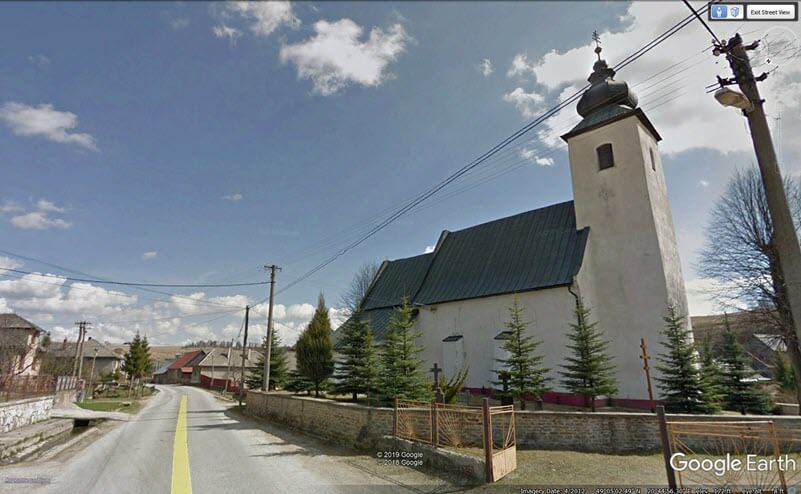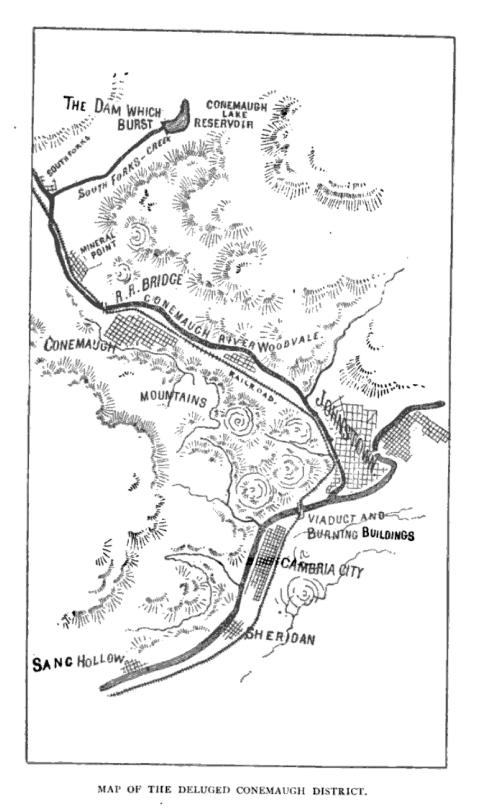by Lisa Cooke | Oct 1, 2019 | 01 What's New, Brick Wall |
Podcasts are hotter than ever. Folks listen while doing a wide range of activities: working, exercising, commuting, cooking or simply relaxing.
My hope is that as you listen to the free Genealogy Gems Podcast (and the ad-free Genealogy Gems Premium Podcast to which our members have exclusive access) you’ll not only listen, but put into action the ideas and strategies that you hear.
That’s why it’s so rewarding when a listener takes the time to write and let me know what they accomplished using the techniques they heard about on the show or in our videos.

Busting Genealogy Brick Walls
But can a podcast help you bust a genealogical brick wall? Well, according to listener and Genealogy Gems Premium member Natalie Zett, you bet they can! With Natalie’s permission I want to share her email with you today because I believe it will not only inspire you, but it also provides an excellent example of how to apply what you hear.
“Hi Lisa Louise and the Genealogy Gems Gang –
As a long-time listener and Premium Subscriber, I recently put everything I’ve learned from you to the test!
I’ve traced most of my direct ancestors back to the 1500s–and have a fairly complete family tree. So, I figured that there weren’t any BIG things left to discover.
Then, a few months ago, I searched my father’s surname, “Zett,” among my Ancestry.com (DNA) matches, fully expecting to see family members that I already knew. I wanted to know if they had photos or other records that I didn’t have so I could stay current.
I saw the list of usual suspects (cousins that I’d grown up with), but also saw a handful of new 4th cousin matches who had the surname Zett in their family trees. I had no idea who any of these matches were!
A closer look revealed that those matches with family trees shared a common ancestor: “Caroline Zett,” who was born “in Hungary” around 1859 and died in Syracuse, New York around 1899.
The records for Caroline were scant–besides the family tree listings, there were only a few census entries, and marriage certificates for her children. Initially I thought she married into our family, but it appeared that Zett was her birth name. “Caroline” however is not a name I would expect to see.
My Zett ancestors are Carpatho-Rusyns, an ethnic minority from the part of the former Austro-Hungarian Empire that is now Eastern Slovakia.
Our surname was “Zid” in Slovak or “Zsid” in Hungarian, but in terms of first names, there wasn’t much variation.
My direct-line female ancestors were: Maria, Anna, and Elizabeta. Within their nuclear families, names were often recycled. For example, if a girl called Maria died and another girl was born later, she might also be named Maria –this made family tree work a lot of fun! So, “Caroline” didn’t fit into that naming tradition–and, to my ears, didn’t sound Slavic.
Caroline’s husband was called John Frisco, which also didn’t sound very Slavic (the Frisco’s I knew were all Italian). Marrying outside of one’s ethnic group in the 1880s would have been unusual, so that also was a puzzle.
And Syracuse, New York was also perplexing. My grandparents on both sides immigrated from Eastern Europe to Johnstown, PA, and those who did branch out, moved westward. I knew of no one in the family who settled in New York.
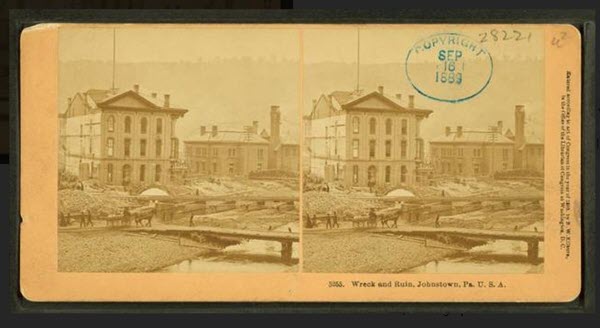
Famous for a flood: “Wreck and Ruin, Johnstown, PA U.S.A.” Kilburn Brothers, Photographer (Public Domain)
What was going on here? The brick wall I was hoping to scale was turning into genealogical quicksand!”
WWLLD Leads to 4 Actionable Steps
“So, in the spirit of WWLLD (“What Would Lisa Louise Do?”), I countered that confusion with the following actions!!
1. Created a private family tree on Ancestry for Caroline (Editor’s note: an idea discussed in episode #229) and her descendants and conducted records searches, which provided clues:
-
-
Two of Caroline’s children were listed as being born in “Hungary” which is something I’ve often seen in my early research (for years, I thought I was Hungarian!)
-
Another child was born in Johnstown in 1888. Besides the Johnstown connection, this was significant since my great-grandparents briefly lived in Johnstown during that same time period before returning to Slovakia.
-
The obituary of another child mentioned that she was buried in a Greek Catholic cemetery in Syracuse. This was also significant since, at that time, Rusyns were usually members of the Byzantine (Greek Catholic) church.
2. Used triangulation to validate that all of these “Caroline” matches belonged to my paternal grandfather’s family.
3. Reached out to the DNA matches (heard from just one person who had no information about Caroline).
4. Also used Ancestry’s “Predicted relationship” tool, which showed that these matches and I shared the same gr-gr-great grandparents.
All signs pointed to Caroline being the sister of my paternal great-grandfather, Andreas. But the records for my great-grandfather’s siblings listed Maria, Anna, Anna, Anna, Anna, Elizabeta, George, and Adam. (Yes, there were four different Anna’s among those siblings!). No Caroline to be found there.
I took a closer look at those records though and found that Elizabeta was born the same year as “Caroline” (1859) and later married Joannes Fecko (which sounds somewhat like John Frisco). This is where my intuition kicked in and said I’d found them!
Still, I wanted to be sure, and consulted with a cousin who’s an expert on our Rusyn ancestors. Having traveled back and forth to our ancestral home village, Olsavica, Slovakia many times, cousin Dave has collected lots of records throughout the years. (Most of these records are unavailable online).
Dave reviewed these records against my research and found the marriage for Elizabeta and Joannes. He further found the birth records for two children who were born in Olsavica. The names and birthdates of these children exactly matched the records for the children I’d located.
He concluded that Elizabeta and Joannes immigrated to America in the late 1880s and would have been among the first immigrants from Olsavica to venture to the USA.
He further theorized that, after my great-grandparents returned to Olsavica, Elizabeta and Joannes may have decided to adapt to America ways quicker than they would have otherwise to survive, thus adopting names that (to them) sounded more American.
So, Elizabeta became Caroline and similarly, her husband, Joannes Fecko, became John Frisco! Also, since Elizabeta and Joannes were living in Johnstown during the great flood of 1889, that might have inspired them to relocate to Syracuse.
I can only say WHEW!
This is the first time I’ve run into this type of name switching in my ancestral research!
In tandem, I wonder if any living Frisco cousins grew up thinking they had Italian ancestry –and are puzzled as to why this isn’t showing up in their Ancestry DNA results!
Should I ever establish/reestablish contact with any of them, I’m sure they’ll be surprised as well!
I didn’t realize how much knowledge I’d absorbed (actively or even passively) from listening to your podcasts, watching your videos, and reading your articles. But whenever I hit a roadblock, I always had another tool I could pull out, e.g., Hit a dead-end with records? No problem, just study the DNA matches (editor’s note: as we discuss in many Premium videos and podcast episodes like Episode #197.) When that stops working, look at newspapers and Google Books! I had it covered!
(Editor’s note: Here’s a listing of all our articles on Newspaper research. Genealogy Gems Premium eLearning members can watch the full length video class Google Books: The Tool You Should Use Every Day here.)
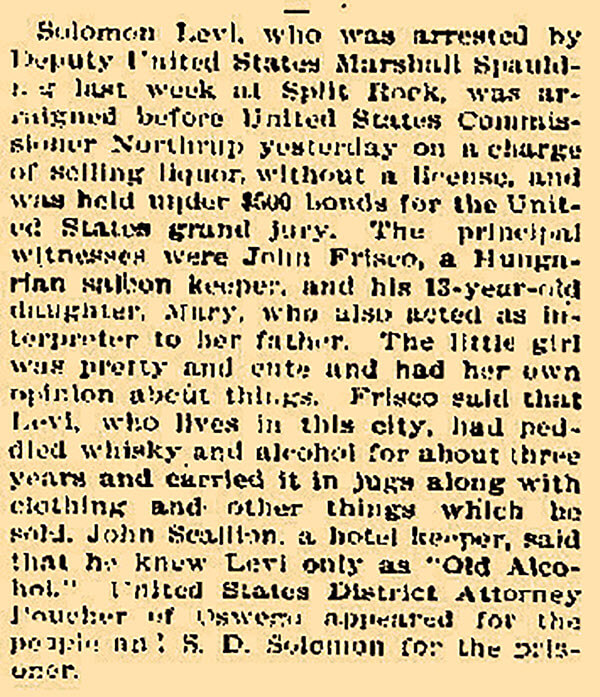
Newspaper found! “Solomon Levi, who was arrested by Deputy United States Marshall Spaulding last week at Split Rock, was arraigned before United States Commissioner Northrup yesterday on a charge of selling liquor without a license, and was held under $500 bonds for the United States grand jury. The principal witnesses were John Frisco, a Hungarian saloon keeper, and his 13-year-old daughter, Mary, who also acted as interpreter to her father. The little girl was pretty and cute and her had own opinion about things. Frisco said that Levi, who lives in this city, had peddled whiskey and alcohol for about three years and carried it in jugs along with clothing and other things which he sold. John Scallion, a hotel keeper, said that he knew Levi as “Old Alcohol,” United States District Attorney (illegible) of Oswego appeared for the people as: S.D. Solon for the (illegible).” January 16, 1896. The Syracuse Standard.
Although I didn’t get this written until (now), rest assured that I thought of each of you at Genealogy Gems and was so grateful!
Thank you for helping me place my Great-Aunt, Elizabeta/Caroline and her descendants in their rightful place in our family tree!! It’s quite a story and I couldn’t have cracked that wall without you.
Thanks for the continual inspiration. I swear my IQ has gone up several points since I began listening to GG!
With gratitude, Natalie Zett”
Share Your Story
Reading the challenges faced and strategies used by other researchers can help to reinvigorate our own genealogical search. Thank you to Natalie for taking the time to write and for providing permission to share her story.
Have you made an exciting discovery thanks to something you heard on the Genealogy Gems Podcast? Please leave a comment below!
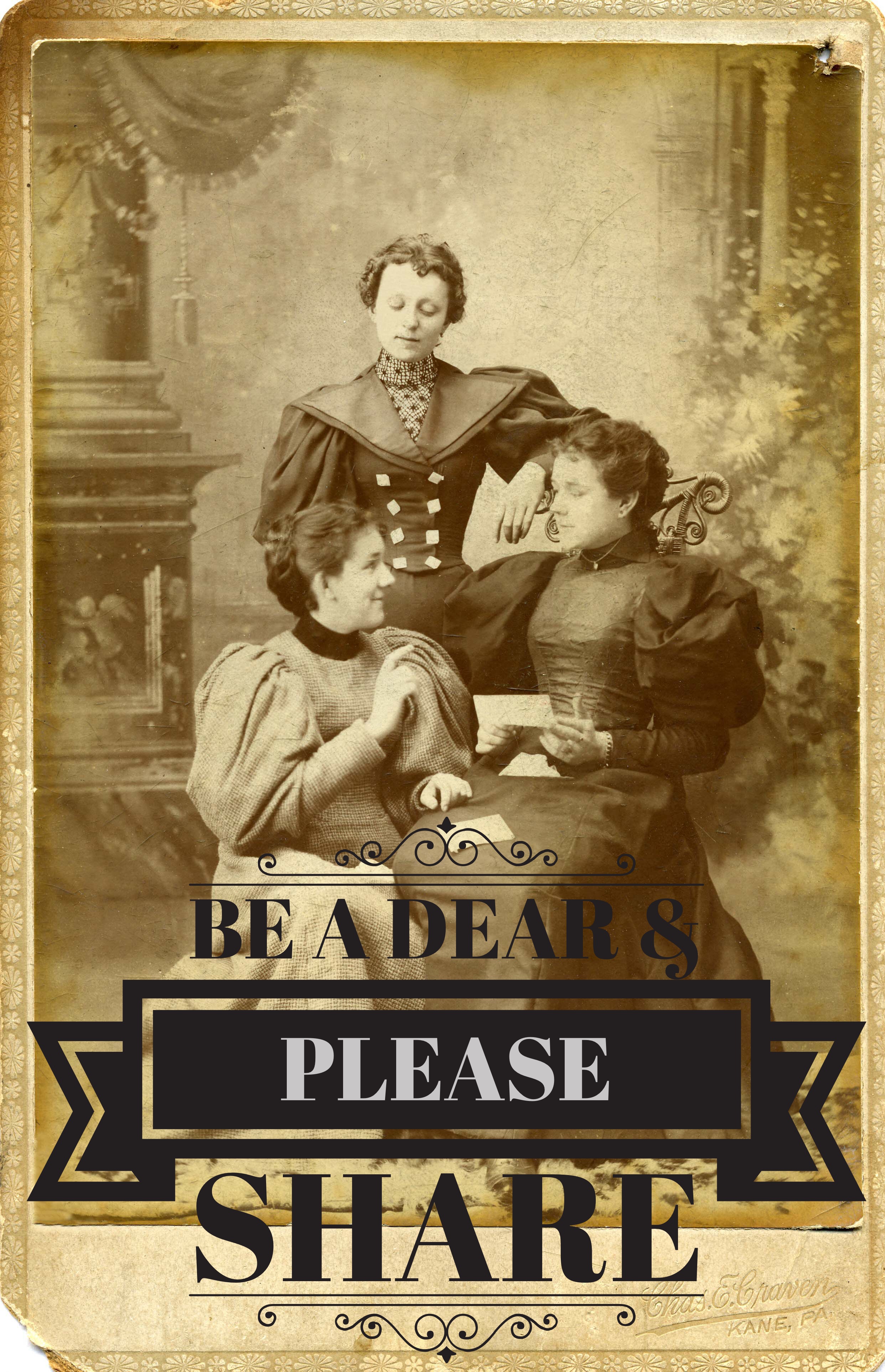
by Lisa Cooke | Aug 16, 2011 |
The Genealogy Gems Podcast Episodes
2009 Season Four
Scroll to the bottom of each Podcast Show Notes Page and click the episode mp3 file to download the episode for listening. It will take a minute or two for the episode to download, and it will open in your computer’s audio program (for example: Quicktime or Windows Media Player.)
Episode 61 Listen & Show Notes
A sneak peek at the new website GenSeek with Steve Nickle, President of Familylink.com. And Part 2 of Lisa’s interview with Darby Hinton where they discuss the Hinton Family History.
Episode 62 Listen & Show Notes
Go Genealogical Channel Surfing: Part 3 of Lisa’s interview with Darby Hinton about his new TV pilot Hintons Living History. Hang Ten with Ken Marks, executive producer of the new TV series Legend Seekers.
Episode 63 Listen & Show Notes
Lisa conducts an exclusive interview with Dr. Tukufu Zuberi, star of the hit TV series The History Detectives.
Episode 64 Listen & Show Notes
New Online Newspaper Databases, An answer to a listener’s Family Tree Maker software question, A Gem of an Idea: Online Downloadable Source Citations, Interview with Maureen Taylor, and the History of Casey Jones
Episode 65 Listen & Show Notes
Interview with George Morgan, Mother’s Day, Odometer History
Episode 66 Listen & Show Notes
An Important Anniversary: D-Day, Upcoming Genealogy Conferences, Genealogy Records Update, Interview with Kathy Meade of Genline.com about new features at the Swedish records website, and Paper of Record at the Google News Archive.
Episode 67 Listen & Show Notes
Jamboree Highlights, News, Interview with Genealogy Blogger Randy Seaver of the Genea-Musings blog
Episode 68 Listen & Show Notes
GenealogyWise, Lisa on the Genealogy Guys Pocast, Paper of Record Update, Interview with Genealogy Blogger Thomas MacEntee, 40th Anniversary of Apollo 11, A Special Collection at the DAR Library, Lisa to Teach Family Tree Magazine Webinar
Episode 69 Listen & Show Notes
The First U.S. Census, Interview with author and genealogist Tony Burroughs, “My Mother Was a Quilter” by Lee Drew,
Episode 70 Listen & Show Notes
Resources for understanding the U.S. Federal Census, Member Connect Tour with David Graham from Ancestry.
Episode 71 Listen & Show Notes
The new Genealogy Gem rhinestone pin, The Mailbox, Member Connect with Ancestry, Part 2, Family History Thoughts with Lee Drew “Choices & Consequences,”
Episode 72 Listen & Show Notes
Civil War Records, The Mailbox, Probate Records with Jana Broglin, Sorting Your Bookmarks Alphabetically in Safari,
Episode 73 Listen & Show Notes
It’s All About You and Genealogy! New Digitized Newspapers, Premium Episodes.
Episode 73 Video Cast Show Notes
Genealogy News Segment
Episode 74 Listen & Show Notes
An Amazing Story Featuring the DeadFred Web Site (Interview with Joe Bott)
Episode 75 Listen & Show Notes
The New Free Genealogy Gems Toolbar, The Mailbox, Interview with David Rencher, Head Genealogist at FamilySearch About the Digitization of Records and the Future of FamilySearch.
Episode 76 Listen & Show Notes
News, Mailbox, The 1810 Census, Part 2 of Lisa’s Interview with David Rencher Head Genealogist at FamilySearch.org, the Free Genealogy Gems Toolbar.
Episode 77 Listen & Show Notes
News, Mailbox, Interview with Maureen Taylor “The Photo Detective” about ancestral hairstyles, Family Storytelling During the Holidays.
Episode 78 Listen & Show Notes
News, Mailbox, the New Genealogy Gems Podcast App for iPhone and iTouch, Adoption research, 45 History, and a video of Mona Golabek and the inspiring story of her family.
Episode 79 Listen & Show Notes
This episode is a broadcast of the LIVE Genealogy Gems Podcast presented at the Family History Expo in Mesa, Arizona on January 22, 2010 featuring guests Gena Philibert Ortega, Thomas MacEntee, Bruce Buzbee and Anastasia Tyler.
Episode 80 Listen & Show Notes
Lisa’s special guest is Irene Johnson (you know her from the PBS TV series Ancestors). She worked at the Family History Library in Salt Lake City for 15 years and gives us her best tips and tricks.
by Lisa Cooke | Aug 13, 2015 | 01 What's New, Beginner, Blogs, images, Writing Family History
 More and more people are blogging about their family history. Here’s why!
More and more people are blogging about their family history. Here’s why!
When it comes right down to it, many of us want to write up our family stories, but we don’t really want to write or publish a 300-page book. Blogging your family history in short snippets is a perfect alternative! Why?
1. Its shorter, flexible format is much less intimidating for many people. You don’t have to lay out a book or fill hundreds of pages. You can write a little bit at a time, as your time and mood permit.
2. A blog is like your own family history message board. Every word you write is searchable by Google–which means others researching the same family lines can find and connect with you.
3. A family history blog can help bust your toughest brick wall. I’ve heard and shared countless stories here at Genealogy Gems from readers and listeners of how just “putting it out there” on a blog led to someone contacting them with a treasure trove of new information about their family tree.
4. Writing a narrative about your research will help you identify gaps in your research. Sometimes errors or bad assumptions you made will jump out at you.
5. Your kids and grandkids are (or will be) online. They will more likely want to read quick and easy stories on the go on their smart phones and tablets. Putting your research out there on a blog provides them with an easy way to digest the family heritage and subscribe to it, since blogs can be delivered to their email inbox or to a blog reader.
6. Because there are no excuses. You can start a blog for free. There are no rules, so you can decide how often and how much you write at once.
7. If you leave the blog online, it will still be there even when you’re not actively blogging. You will continue to share–and you may continue to attract relatives to it.
Resource:
Start a family history blog with this free series from our Family History Made Easy podcast (an online radio show)
Part 1: What to Consider when Starting a Genealogy Blog. The “Footnote Maven,” author of two popular blogs, talks about the process of starting a genealogy blog. She gives great tips for thinking up your own approach, finding a unique niche, commenting on other people’s blogs and more.
Part 2: Insights from Popular Genealogy Bloggers. We hear from two additional popular genealogy bloggers, Denise Levenick (author of The Family Curator and alter ego of “Miss Penny Dreadful” on the Shades of the Departed blog) and Schelly Tallalay Dardashti (author of the Tracing the Tribe blog).
Part 3: Step by Step on Blogger.com. How to create your own free family history blog on Blogger.com. Learn tricks for designing a simple, useful blog and how NOT to overdo it!
Final tips: Wrap-up and inspiration. In this concluding episode, learn how to add a few more gadgets and details to your blog; pre-plan your blog posts, publish your first article, and how to help your readers subscribe. You’ll also get great tips on how to create genealogy content that others looking for the same ancestors can find easily online.
 SHARE! Invite someone you know to start a family history blog by sending them this post. They’ll thank you for it later!
SHARE! Invite someone you know to start a family history blog by sending them this post. They’ll thank you for it later!
by Lisa Cooke | Jan 21, 2014 | 01 What's New, Family History Podcast, Interviewing
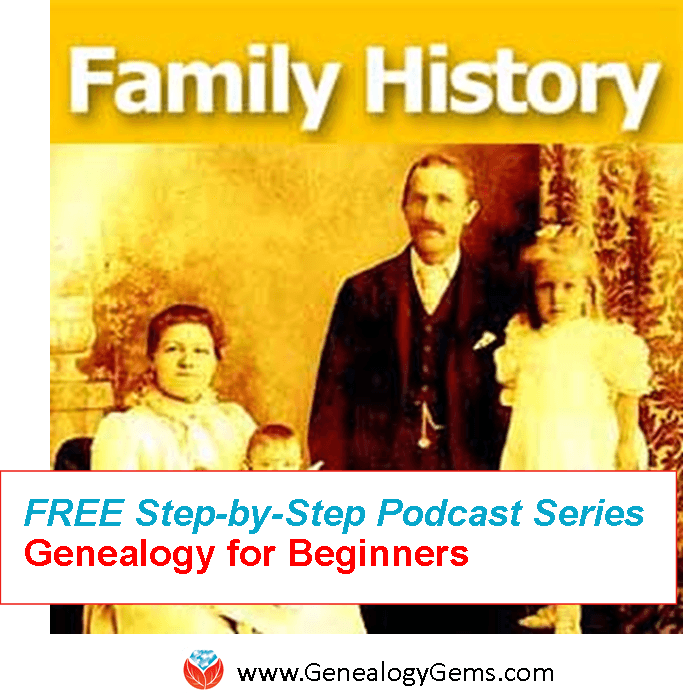
Listen to the Family History: Genealogy Made Easy podcast by Lisa Louise Cooke. It’s a great series for learning the research ropes and well as refreshing your skills.
Originally published 2009
Republished January 21, 2014
https://lisalouisecooke.com/familyhistorypodcast/audio/fh15.mp3
Download the Show Notes for this Episode
Welcome to this step-by-step series for beginning genealogists—and more experienced ones who want to brush up or learn something new. I first ran this series in 2008-09. So many people have asked about it, I’m bringing it back in weekly segments.
Episode 15: Genealogy Cold Calling II: 14 Tips for Contacting Distant Relatives
Connecting with someone who knows about our ancestors can really boost our research results—and even create new relationships among living kin. But it’s not always easy to send that first email or make that call.
In today’s episode we talk about the skill of “genealogical cold calling.” Relationships are key to genealogical success and by following 14 genealogical cold calling strategies you will find your research relationships multiplying. We’ll chat with my cousin, Carolyn Ender, who has conducted hundreds of telephone interviews. She has a knack for quickly connecting with folks she doesn’t know over the telephone in ways that put them at ease and bring to light the information that she’s looking for.
But first, we do some follow up with an email from a listener about family trees. Then, I share a little story that puts into practice what we’ve learned so far in this podcast series.
14 Steps to Genealogical Cold Calling Success
#1. Identify the person you want to call.
#2. Locate the person’s phone number. Below are some great websites for locating people you don’t know. The list is updated from the one given in the show. And Whowhere.com now has an app for Android, iPhone and other mobile devices. Check it out
Don’t forget to search the entire metro area, not just one city. Try just searching their first name particularly if it’s not a really common first name. Try and track down their number through other relatives or researchers. If all else fails consider posting on a message board for the surname
#3. Prepare ahead for making the call.
Every tough job gets just a little easier when you do your homework first. Follow these tips:
- Take into account a possible difference in time zones.
- Choose a time when you are not too rushed
- Do a brief review of the family you are researching so it’s fresh in your mind
- Make note of specific questions you would like to ask.
- Have your genealogy software program open or your written notes at your fingertips.
#4. Get up the “nerve” to call.
Remind yourself how valuable this person’s information could be to your research. If he or she is quite elderly, remember that none of us will be around here forever so you need to make the call today! Say to yourself: “I can do this. This is important!” And be positive and remember, all they can do is say “no thank you.”
#5. Introduce yourself.
Give your first & last name & tell them the town and state where you live. Then tell them the family connection that you share, and tell them who referred them to you or how you located them before launching into why you’re calling or what you want.
#6. Overcome reluctant relatives.
Be ready to share what you’ve learned, and to share your own memories of a relative that you have in common. Mention something of particular interest in the family tree that might pique their interest.
If they are very hesitant you could offer to mail them some information and offer to call back once they’ve had a chance to look at it. That way they can sort of get their bearings too.
#7. What to do during the call
You’ll want to take notes during the phone call. Try a headset which will help to free up your hands for writing. Handwriting is preferably over typing.
Take the opportunity to not just get new information but also to confirm information that you already have–just to make sure it’s correct.
If you have a way to record the call, you don’t have to take notes and focus all of your attention on the conversation, and then transcribe the recording later. If you want to record, ask permission: in some places, it’s illegal to record a conversation without permission and it’s common courtesy to say you’re taping them. But it might put off a stranger; perhaps taping could wait until a second call.
#8. Leave a detailed voice mail message if there’s no answer.
State your name and that you would like to talk with them about the family history. Leave your phone number and tell them that you will call them back. Consider leaving your email address and suggesting they email you with a convenient time to call back.
Be sure and keep track in your genealogy database each time you call and what messages you leave. Having a log of calls and voice mail messages you’ve left will help you keep track.
#9. “Must-ask” questions.
- “Do you or anyone else in the family have any old family photographs, or a family Bible?
- (Reassure the person that you would only be interested in obtaining copies of any pictures or mementos they might have.)
- “Do you know anyone else in the family who has been doing family research?”
- “May I have your permission to cite you as a source in print in the future?”
- “Is it OK with you if I keep in touch from time to time?”
#10. Wrap up the call.
- Ask for their mailing address and email address.
- Offer to give them your address and phone number.
- Let them know you would be pleased to hear from them if they come across any other information, pictures, etc.
#11. Document the call.
Sit down at the computer or your notepad right away and make detailed notes about the phone conversation while it’s fresh in your mind. Include the person’s name, address, phone number and date of conversation. Make notes regarding any items you think may be questionable to remind you to go back and do more research on those points. At the bottom of the page list the ACTION items that come to mind that you want to follow up on based on the conversation. Enter their contact information into your genealogy database as well as your email contact list.
#12. Enter new information Into your genealogy database.
This is a must. Do it right away while it’s on your mind.
#13. Create an action item list.
Create action items based on what you learned. Ask yourself “What are the logical next steps to take considering what you’ve learned through this interview?” The call is not the end result, it’s a step in the research process, and it can really help to make this list now, and while it’s fresh in your mind.
#14. Follow up.
Send the person a written note or email thanking them for taking the time to talk with you. If the person mentioned that they would look for pictures or would look up something in a family Bible etc., mention in your note that you would still be interested in anything they can help you with and that you would be glad to pay any copying expenses, postage etc. Offer to provide copies of your information or copies of pictures you have etc. You never know: they might catch the genealogy bug and become your new research partner!
Next, put their birthday on your calendar and send them a card on their next birthday. It’s another way of keeping the connection going and expressing that you really do appreciate all their help. Try this service: Birthday Alarm.
Occasionally make a follow up call to check in and see how they are doing, share any new family items she’s come across recently, and ask if they have they heard or found anything else.


